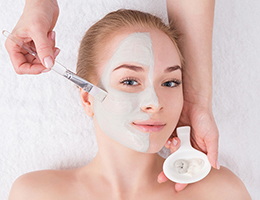The U.S. professional skin care market performed at its best in 2017, posting a strong growth of over 6%. Findings from our recently published U.S. volume for our Professional Skin Care Global Series reveal several reasons behind this solid growth, and some of the noteworthy developments are discussed below.
- Two key channels continue to dominate
The medical care providers channel is the largest channel of distribution and continues to gain market share. The number of physicians providing skin care treatments and dispensing products is increasing quickly, creating a favorable environment for beauty marketers. Retail, the other dynamic channel, continues to gain traction, especially the Internet, as consumers are re-filling their products through this sub-channel. In addition, Amazon strengthens its footprint in the professional skin care space, increasing its portfolio of brands throughout 2017.
- Small and medium-sized brands shine bright
While the U.S. professional skin care market is primarily dominated by large cosmetic/pharmaceutical companies, small and niche brands drive the market forward. These brands include Alastin and SkinBetter Science, which record triple-digit growth in 2017, driven by new product launches and expansion in distribution. Medium-sized brands, including EltaMD, PCA Skin, and ZO Skin Health, also continue to record double-digit growth.
- Ingredient formulation continues to be important
Retinols, hyaluronic acid, and vitamins are the trending ingredients in the United States as several large and medium-sized marketers introduce products formulated with these ingredients, such as SkinCeuticals H.A. Intensifier by L’Oréal, Dermalogica Overnight Retinol Repair by Unilever, and PCA Skin’s Hyaluronic Acid Boosting Serum. Anti-pollution also becomes a greater trend throughout the year as consumers learn more about the effects that airborne pollutants have on one’s complexion and marketers introduce products, such as Pollution Shield Broad Spectrum SPF 46 Sunscreen by Senté and Alto Defense Serum by SkinBetter Science. Most recently, SkinCeuticals debuts DOSE, its newest technology that creates personalized skin care serums, which is expected to launch in Summer 2018.
- Emergence of new outlets
As the professional skin care space continues to record strong growth, outlets dispensing skin care and offering professional treatments continue to evolve. While SkinCeuticals remains focused on opening more Advanced Clinical Spas, a new concept that the marketer began rolling out in 2016, the market also sees an expansion of doors from emerging players like Alchemy 43 and Skin Laundry, both of which fall within the medical spa realm. Skin Laundry specializes in laser and light therapy with 13 locations in the United States in 2017, and Alchemy 43, with currently only one location in 2017 and plans to expand, concentrates on cosmetic microtreatments. Rising interest from consumers for custom-tailored beauty and fun store formats suggests that more specialty professional doors will surface in the coming years.
- Consolidation continues with larger players entering the market
Mergers and acquisitions continue to consolidate the professional skin care industry as Colgate-Palmolive, one of the personal care giants, forays into this industry in late 2017 with the acquisition of two strong-performing brands—EltaMD and PCA Skin. Valeant Pharmaceuticals also sells Obagi Medical Products to Haitong International Zhonghua Finance in mid-2017 for $190 million.
As the 2017 edition of our Professional Skin Care Global Series is now available, stay tuned for the upcoming launch of our 2018 edition, which includes major markets like China, Mexico, Europe, and the United States. In addition, our Physician-dispensed Skin Care: U.S. Perception and Satisfaction Survey will be published in June 2018, a study that helps marketers understand what skin professionals value most when it comes to the brands they use.

